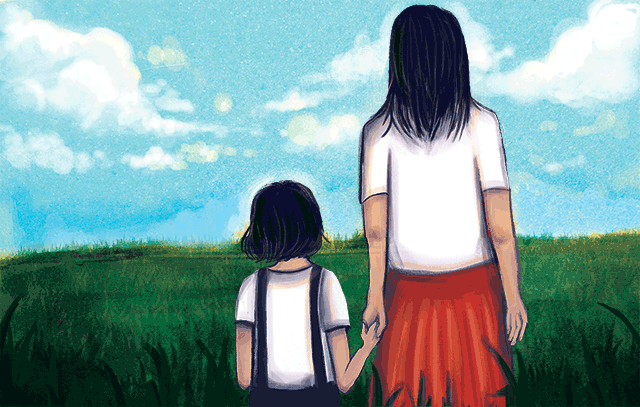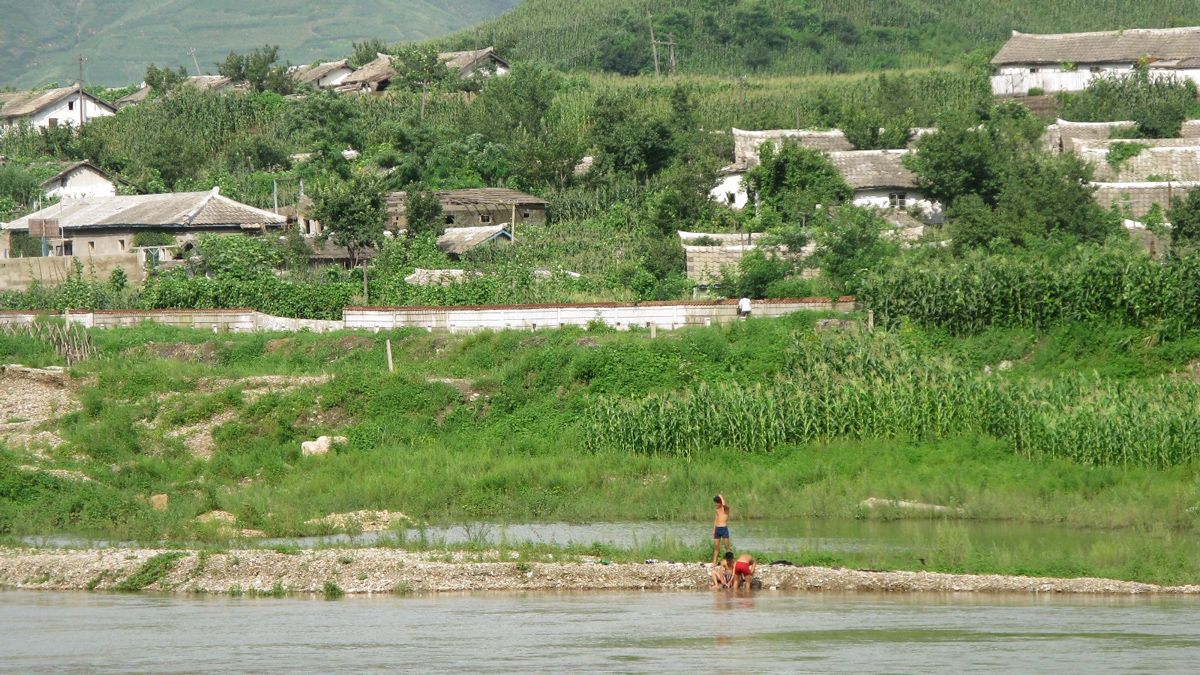North Korean Refugee Stories: Meet Yoon Suk

Yoon Suk has vivid, happy memories of growing up in North Korea. She was raised during a time when state-socialism was relatively functioning, and the government could provide basic necessities to its citizens. She remembers wearing beautiful nylon (a highly-sought after fabric back in the earlier days of North Korea) uniforms with bows and red, patent-leather shoes to school. She also had a passion for the arts and performed frequently on stage. But as she grew older, the shine in her shoes began to fade and the hunger in her belly began to grow.
After the collapse of the Soviet Union, North Korea lost crucial sources of subsidized trade and aid and the North Korean economy crashed. It was during this time that Yoon Suk got married, but what should have been a happy time in her life ended up being far from it. The regime’s mismanaged agricultural and environmental policies were confounded by harsh weather, plunging the country into a severe famine that lasted for years. Yoon Suk and her husband struggled to survive on the meager rations they received—and they were not alone. During this period, an estimated one million people died from starvation, while many of those who survived suffered immensely.
Yoon Suk, knowing that she had to do something to keep her family alive during the most difficult years of the “Arduous March,” turned to the jangmadang—small, illegal markets where people sold and traded anything they could for food. Yoon Suk was like many North Korean women in this new reality, abandoning her traditional role for market activities. Unfortunately, running her modest merchant business was more challenging than she had anticipated and she struggled to keep it afloat. As the situation grew worse, she discontinued her business and looked for other ways to support her family, which had grown by two with the birth of her sons. It was during this time that she learned that life might be better in booming China.
As recently as three decades ago, Chinese people were on average poorer than their North Korean neighbors. But China’s economic reforms have produced wealth and opportunities that are the envy of nearly all North Koreans today. Since North Korea’s economic collapse, which lead to unprecedented cross-border movement and inflows of Chinese goods and media, North Koreans have gained a painful awareness of just how far their formerly impoverished Chinese neighbors have come.

But it’s extremely risky for North Koreans to escape their country. The North Korean regime makes it illegal to leave without explicit permission and if Yoon Suk was caught trying to escape, or caught in China and sent back, she would be punished severely. Yet, the opportunity was too great to pass up and she fled for the first time in the mid-2000s.
Once she arrived, alone in a foreign country where she didn’t speak the language, Yoon Suk was sold to a Chinese man as his bride. China’s lack of marriageable women, particularly in rural areas of the northeast, creates high demand for female North Korean refugees like Yoon Suk. Without legal status and no protection from the authorities, these women are often kidnapped by sex traffickers and sold, sometimes for as little as $200.

Even though she was now living with a Chinese man, Yoon Suk still wasn’t safe from the watchful eye of the Chinese authorities. North Korean refugees’ well-founded fear of persecution if repatriated means that they should be protected under international refugee law. However, the Chinese government labels them as “economic migrants,” so they can forcibly send them back, as per their agreement with the North Korean regime. Yoon Suk was caught by Chinese police not even a month after arriving and was forcibly repatriated back to North Korea. There, the authorities sent her to a prison camp, where she was abused, beaten, and starved.
After all she had gone through, Yoon Suk was still undeterred from finding freedom outside of North Korea. She escaped again to China shortly after her release from the prison camp. She was sold off three times by traffickers, again under the pretense that she was going to be given work. With the last husband, she had her beautiful daughter.

Yoon Suk wanted to give her daughter a better life, and knew that would not be possible in China. Without the proper documentation, her daughter would have difficulty even going to school and would be denied the opportunities available to other Chinese children. Yoon Suk and her daughter escaped China together through Liberty in North Korea’s network and are now on their way to safety in South Korea.
Yoon Suk is excited for the life and opportunities that lie ahead of her. She’s a talented cook and wants to explore the option of obtaining a culinary certificate in South Korea. She also has high hopes for her daughter, who loves art just like her mother did as a young girl, and wants to enroll her in dance and painting lessons. Yoon Suk’s greatest wish is to reunite with her two adult sons someday. She often dreams about appearing on TV to send a message to her sons, showing them she’s alive and well.
Thank you for helping supply the funds for Yoon Suk’s rescue. Your efforts have changed her life and have provided the opportunity for her to enjoy her new LIBERTY.
Fundraise or donate to help rescue more North Korean refugees today!
Lost Stories from North Korea — A Life With No Exit
By Jane
Jane is a participant of LiNK’s Intensive English Program (LIEP), designed to build the capacity of North Korean English speakers at the intermediate level. In partnership with the British Council, LIEP aims to cultivate participants’ communication and critical thinking skills in English. LIEP is complementary to our broader LiNK English Language Program (LELP), which supports speakers of all proficiency levels.

When I was young, we lived in the countryside. Like the other kids, I had to help my mom with farming. It was hard work. From spring to fall, everything was difficult. Carrying a heavy load on my back, climbing up the mountain, my hands covered in blisters from using farming tools—I would often return home late, completely exhausted.
Our field was located at the top of a high mountain. From there, I could look down and see the Amnok River flowing, with a railway track stretching beside it. One spring day when I was around 13, I was resting at the top of the mountain, looking down at the train passing by below.
Watching it move slowly like a caterpillar, I thought to myself, "I want to get on that train and go somewhere far away." That was the first time I dreamed of escaping. We were living in a prison with no exit, no hope.
Eventually, I managed to escape from that life in that prison. But my mother must have continued climbing that mountain and working in that field for many more years. Perhaps, during her moments of rest, she would look down at the river and the railroad. Perhaps, she thought about me, who had left for a place far away.
Now, I am living well in South Korea, as a mother of one myself. I carry dreams and hope in my heart. But not everyone has been as fortunate as I have in finding a way out.
I have a friend, a North Korean defector now living in the United States, who once shared a story that moved me to tears. A few years ago, she fled North Korea with her two young daughters and eventually made her way to America. She attempted to reach South Korea twice. The first time, she set out with her daughters, ages seven and eleven. They wandered for days through the vast Baekdudaegan mountains. When their water ran out, she dug into the earth with her bare hands, squeezing out a few drops to moisten their mouths.
Along the way, they came across the bodies of two people, sitting with their backs leaning against each other in the middle of a field. From their clothes, she could tell they were North Koreans, their bodies already beginning to decompose. Fearing that she and her daughters might meet the same fate, she decided to turn back and return to North Korea.
As I listened to her story, I couldn’t hold back my tears. Who were those two souls lost in the mountains? Where had they been trying to go? How long had they wandered? They might have been so exhausted that after sitting back to back, they couldn’t get up again. What thoughts filled their minds in their final moments?
That’s why I want to be a writer—to share these stories with the world.
For the people in North Korea who still dream of breaking free from a life with no exit, and for the nameless souls who never made it to freedom.
-
Opportunities like LiNK’s Intensive English Program (LIEP) are helping North Koreans find their voice, reach their goals, and lead change on this issue. Your support can help us continue to make an impact in the lives of North Korean refugees, like Jane.
Give Today




